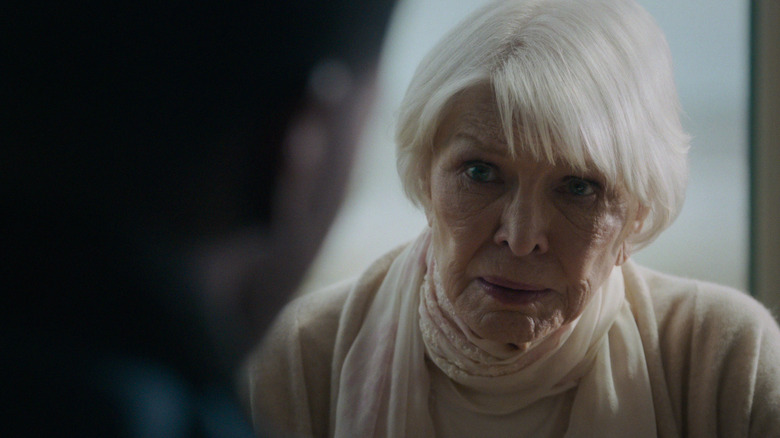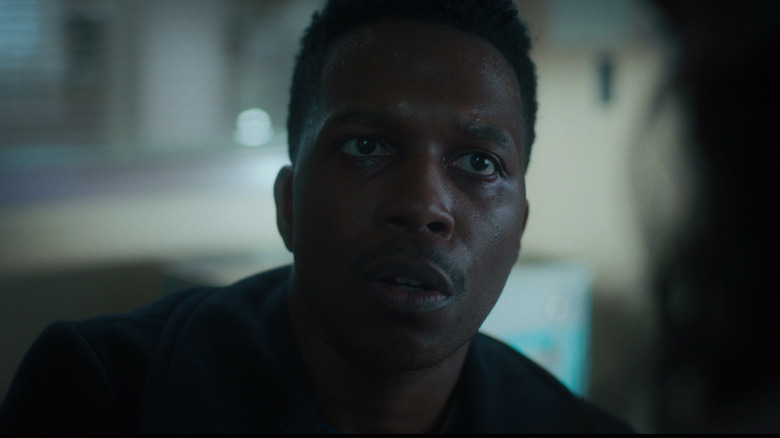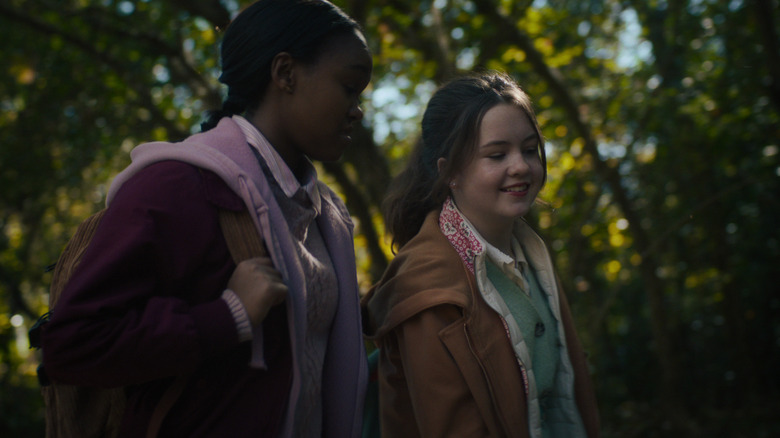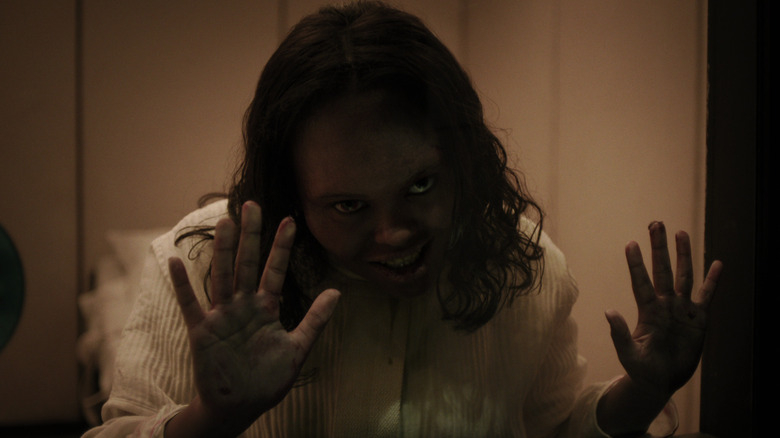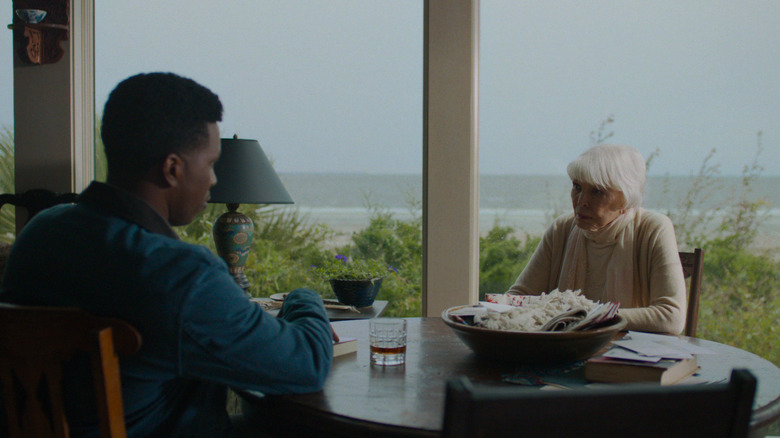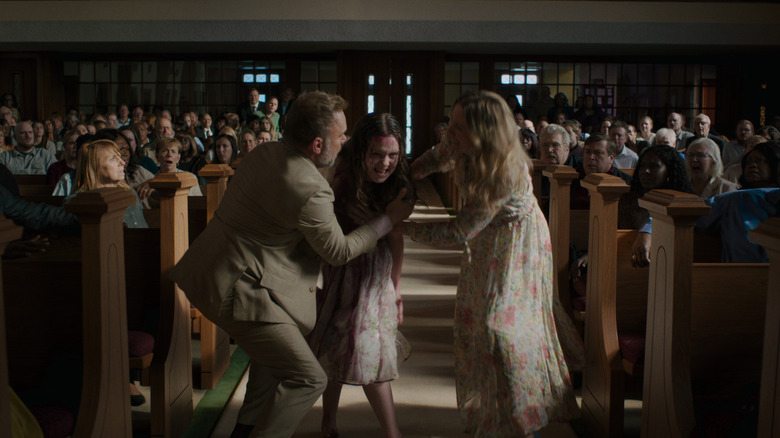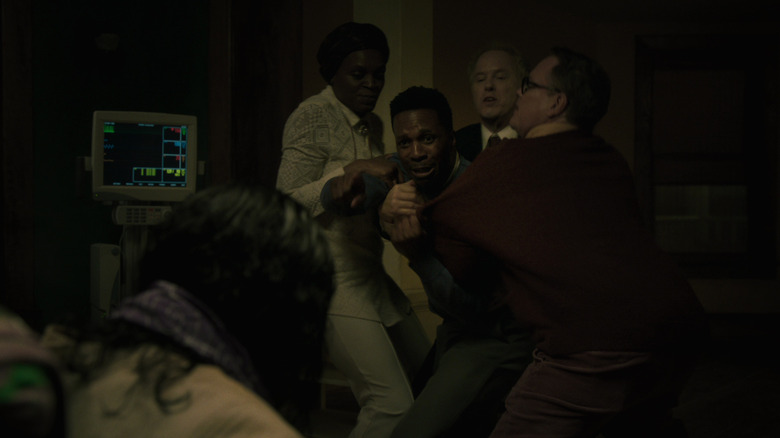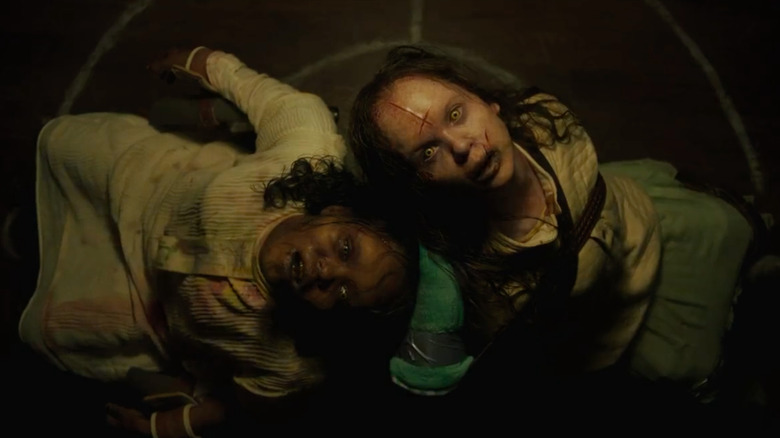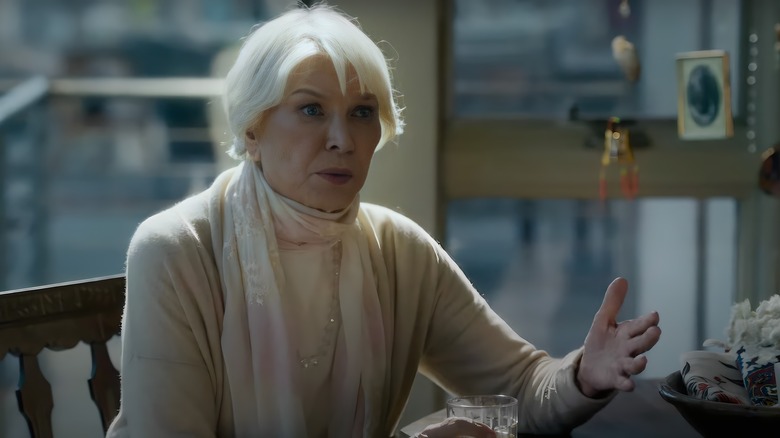The Exorcist: Believer Ending Explained: People Who Need People
This post contains major spoilers for "The Exorcist: Believer."
William Friedkin, the immortal director of the original 1973 "The Exorcist," who passed away earlier this year, was fond of saying that his film of William Peter Blatty's novel was all about the "mystery of faith." Faith, especially the religious kind, is a continually hot topic given humanity's ever-increasing body of knowledge about the world and each other. "The Exorcist" is a brilliantly ambiguous film, almost because it has to be; where Friedkin and Blatty sought to prove the existence of Good (if not God) via a grounded, brutal portrayal of the possession of Regan MacNeil (Linda Blair) by the demon Pazuzu and her subsequent exorcism by two Catholic priests, many audiences found themselves terrified by the potential existence of such diabolical Evil.
Point being, it's a lot easier and simpler to believe in the existence of Evil than that of Good. As permissiveness in culture has changed and expanded during the 50 years since the first "Exorcist" was released, belief systems have further fractured while going to greater extremes. There are, seemingly, even more zealots these days as they make their voices loud and heard, and the aggressive secularization of the majority of society only fuels the fire of the attendant arguments and confusion.
Director and co-writer David Gordon Green's "The Exorcist: Believer," the sixth in the franchise (though made with the assertion that only the '73 film is canon), seeks to address our current crisis of faith and belief, once again using the violating possession of a young girl (two of them, in fact) to ask questions about which, if any, belief systems are valid. "Believer" postulates that not only do all (or at least most) faiths hold validity, but that humanity's biggest weapon in the fight against Evil is each other.
Whole lotta shakin' goin' on
"Believer" begins in 2010, where Victor Fielding (Leslie Odom, Jr.) and his wife, Sorenne (Tracey Graves) are vacationing in Port-au-Prince, Haiti. The couple are awaiting the birth of their daughter, whom they've already named Angela, and even though Sorenne is close to her due date, they're taking a walking tour of the city as Victor, a photographer, captures the sights. Green includes a few homages to Friedkin's film in this sequence, beginning a long string of visual and thematic references: the movie opens with a shot of two dogs fighting, in the same fashion as some other dogs did when Father Merrin (Max Von Sydow) approached a statue of Pazuzu in Iraq during the similarly international opening of the original "Exorcist."
Adding to that already portentous omen is Sorenne excitedly telling Victor all about how a local boy and his mother insisted on bestowing a Voodoo blessing on Angela, a protection spell in particular. Later, as Sorenne rests in their hotel room while Victor is off getting more photos, a violent earthquake rocks the city, causing a great amount of death and destruction. Victor finds Sorenne trapped and gravely wounded by a part of the hotel that's collapsed. Getting her to a local doctor helping with triage, the physician gives Victor not only bad news, but a terrible choice to make: they can only save Sorenne's life by endangering Angela's, so Victor needs to choose who the doctors will try and resuscitate.
Into the woods without regret
13 years later, Victor is now a single father, raising his teen daughter Angela (Lidya Jewett) in the suburbs of Georgia. Angela's a bright, headstrong, and progressive girl, perhaps due to her father's protectiveness; when Angela asks if she can study with a friend of hers after school, Victor tries to convince her to just come straight back home with him instead, as apparently always happens. However, Victor is distracted by Angela wearing a purple scarf (an echo of the first film's purple stoles, which the exorcists wear) that used to belong to Sorenne. Taking the scarf from her, Victor agrees to let Angela hang out with her pal, Katherine (Olivia O'Neill).
Much like young Regan MacNeil was playing with a Oujia board in the original film, Angela and Katherine aren't planning on studying after school. Instead, they go off into the nearby woods to conduct a ritual in the hopes of contacting Angela's dead mother, given that Angela insists that she's heard Sorenne speaking to her recently. After the two girls do not return home that night, Victor, along with Katherine's parents Miranda (Jennifer Nettles) and Tony (Norbert Leo Butz), enlist local authorities in searching for their missing children.
The next three days pass with no sign of the girls, their story becoming a sensation within the local community. At the end of that three-day period, a local farming family discover the girls hidden in the back of their barn, barefoot, with no memory of what has happened to them.
Sometimes they come back
Angela and Katherine are whisked away to the nearby hospital, where they're subjected to a barrage of tests, examinations and rounds of questioning that echo the healthcare woes of the possessed Regan back in 1973. With authorities and their parents initially assuming the worst, everyone is somehow more disturbed to learn that there have been no instances of sexual or physical assault on the girls, nor are there any hints at them being abducted or otherwise detained. According to the girls, they conducted their ritual in the woods, it started to rain, and they began walking only to find themselves lost. Most troublingly, both Angela and Katherine believe it's only been a matter of hours that they've been missing, rather than three whole days.
Given this information, the medical and law enforcement members of the Georgia town find themselves forced to conclude that Angela and Katherine are suffering from some sort of retrograde amnesiac event; the girls can't even remember why they took their shoes off in the woods, nor can they account for the subsequent injuries to their feet.
Miranda, a devout Baptist, has another explanation she deems most likely: demonic possession. In addition to the girls' bizarre story and increasingly erratic behavior, she cites the missing three days as evidence, for as the story goes, after Jesus Christ was crucified he went down to Hell to assert his dominion over all in that realm before returning to Earth three days later. While Tony doesn't quite back up his wife's claim wholeheartedly, he agrees that the girls "brought something back with them."
The true meaning of Chris' mass
Sure enough, things begin to deteriorate once Angela and Katherine are brought back to their respective homes. In Angela's case, she begins acting distant and eerie, making nonsensical comments and seemingly speaking to thin air. Then, upon attacking her father with her mother's old scarf before going into violent convulsions, Victor is forced to take her to intensive care where she's isolated and restrained. Running out of options, Victor takes a tour of a local psychiatric institute, and the disturbing behavior he sees there (not to mention the upsetting conditions) recalls Damien Karras (Jason Miller) visiting his mentally ill mother in the original film, along with Lt. Kinderman (George C. Scott) visiting a psych ward during most of "The Exorcist III."
At the end of his rope, Victor is visited by his neighbor, Ann (Ann Dowd), a nurse at the local hospital who helped treat Angela and who isn't the most friendly neighbor toward Victor. Ann confesses that she used to be a nun-in-training, and abandoned that life after she became pregnant and decided to terminate the pregnancy. Admitting that she never told anyone else of this before, she reveals that a possessed Angela knew her secret name as well as her history.
Ann gives Victor a book, one written by none other than the ex-actress Chris MacNeil (Ellen Burstyn), Regan's mother. In the 50 years since the events of the original "Exorcist," Chris became a writer, investigator, and believer, seeking to help others in situations like she was in all those years ago. Victor tracks Chris down, pleading for her help in person, showing her photos of Angela with letters spelling "Help Me" carved into her skin, just as Regan's had been when she was possessed. Although Chris is quick to point out that she's only become an expert in exorcism and not an exorcist herself, she agrees to try and help.
The body, and the blood
Victor and Chris go to visit Angela, giving some more credence to the former about what predicament his daughter is in: as Chris approaches, Victor realizes that Angela has carved "REGAN" into the wall, confirming that the demon inside the girl knows the older woman. The demon also knows that Regan is a sore spot for Chris; apparently, after publishing her story and speaking on it publicly, Regan severed ties with her mother out of anger at being made a public figure and wishing to live her life in privacy. Chris confesses to Victor that she often wishes she could see her daughter's face again.
Deciding to visit Katherine and her family next, Chris and Victor discover Katherine's home in complete disarray, with the various members of the family cowering in fear away from the possessed girl. Chris confronts the girl, and believes she sees an opportunity to draw Katherine's spirit back into control of her body. Unfortunately, it's just a trick of the demon's, and the possessed girl takes a crucifix and stabs it into Chris' eyes repeatedly. Chris is rushed off to a hospital, leaving Victor, Miranda, and Tony wondering what to do next.
Come together, right now
Throughout the film, various neighbors of Victor like Ann and Stuart (Danny McCarthy), along with Miranda and Tony's Baptist community leaders offer their assistance in helping with these possessions, and now, finally, the parents of Victor and Angela have decided to take them up on these offerings. They reach out to the local Catholic priest, Father Maddox (E.J. Bonilla), to petition the Vatican for the ability to perform an exorcism. Meanwhile, they assemble a spiritual Dream Team, from the Catholic Ann and the Pentecostal Stuart to the Baptist preacher (Raphael Sbarge) and a root doctor, Dr. Beehibe (Owkui Okpokwasili). Although Father Maddox tells the group at the last minute that the Church has deemed the girls' situation as not worthy of an exorcism, Ann rallies the group to move forward, using her belief that God moved through her life, putting her in this town and next to Victor all for this reason.
As the exorcism begins, each member of the group tag teams their way toward expelling the demon from the girls, with the demon attacking them back in turn. The demon, of course, proves to be a cunning and formidable opponent, striking two huge blows during the ceremony. In one, Father Maddox decides to ignore the orders of the Church and join the exorcism. Sadly, it provides an opening for the demon, and his neck is violently ripped away from the rest of his body.
The demon, through Angela, then decides to attack the one member of the group who's yet to admit his belief: Angela's father, Victor. The demon reveals that, way back in Haiti when Victor was given a choice between saving Sorenne or the unborn Angela, he told the doctors to save Sorenne. A tearful demon (or is it actually Angela?) mocks Victor, wondering why he's fighting to save his daughter now when he didn't back then.
Lamashtu, I choose you!
Although not explicitly discussed in the body of the film, according to the official production notes for "Believer," the demon possessing Angela and Katherine is not Pazuzu, the demon who possessed Regan MacNeil. Instead, it's a Mesopotamian demon named Lamashtu (played by Lize Johnston), and, according to the Metropolitan Museum of Art, Lamashtu is "a female demon with broad and far-ranging destructive powers, especially feared by pregnant women and those with newborns, who were her favored (but not only) victims."
After the revelation about Victor and the terrible choice he had to make thirteen years prior, Lamashtu delivers a new ultimatum, one confirmed by the rest of the group present: choose which girl will be allowed to survive. Victor and Miranda see through this choice for the manipulative lie that it is, and refuse to comply. Instead, Victor affirms his love for Angela, apologizing for taking her mother's scarf away from her, and demonstrating his belief in both her predicament as well as the power of the exorcism to stop it.
Unfortunately, Lamashtu's deception works on one member of the group: a distraught Tony, who can't help himself from proclaiming his choice that his daughter should live. This means that Lamashtu, ever the trickster, decides to keep Katherine. A recent interview by /Film's BJ Colangelo with Green revealed that one of the girls dying was not always the case for "Believer," but as Green said, "I wanted to make sure that there was always a mark for the other one [the demon] on the scoreboard." As such, we see Katherine's soul dragged down into the underworld as she dies, which is either an indicator of her fate or a potential set-up for her to return in some fashion in a sequel.
In any case, Lamashtu is banished, and Angela comes back to herself, much to Victor's relief.
Don't stop believing, hold on to that Regan
As "Believer" draws to a close, the surviving characters are all seen finding various ways of coping with their new reality. Tony and Miranda are, understandably, devastated at their loss. Angela is back in school, and while she seems fully back to herself, it's not clear how much of her possession she remembers, even as she worriedly eyes the empty classroom seat where Katherine used to sit.
Ann attempts to debrief local law enforcement about the entire ordeal, explaining in voiceover all about her philosophy (and the film's, of course) that perhaps devout religious belief isn't required of every single human being on the planet in order to further the cause of Good. What may be needed instead is a strong sense of community, togetherness, and tolerance. It's a fascinating counterpoint to the message delivered by Green with his "Halloween" trilogy, which looked at the persistent recurrence of Evil and how it poisons small towns and the world alike. "The Exorcist: Believer" seems to put its mystery of faith within the way people can be stronger together.
Although her sight has been cruelly stolen from her by Evil, Chris' faith and hope to see her daughter again is indeed rewarded, as Regan appears in her hospital room. The woman reconciles with her mother, comforting her.
An interesting historical tidbit: according to text accompanying an amulet with a Lamashtu demon in the Met Museum's collection, "Images of Pazuzu were used to counteract Lamashtu and drive her back into the underworld." Does Regan's presence, given that she's connected to Pazuzu after a fashion, mean more than just burying the hatchet with Chris? Have we seen the last of Lamashtu, Pazuzu, or other ancient demons? Whether the next planned installment of Green's trilogy, "The Exorcist: Deciever," happens or not, the battle of Good versus Evil will never end. All that we can do is help each other and believe in our abilities to make sure Good keeps winning.
